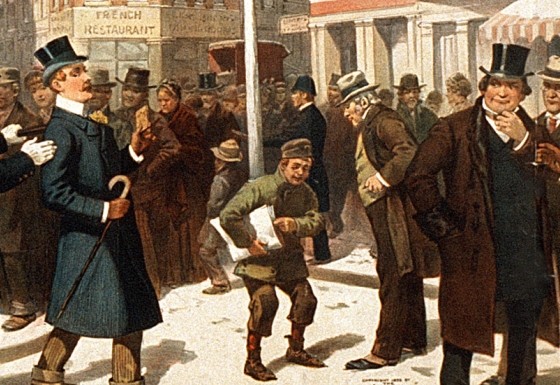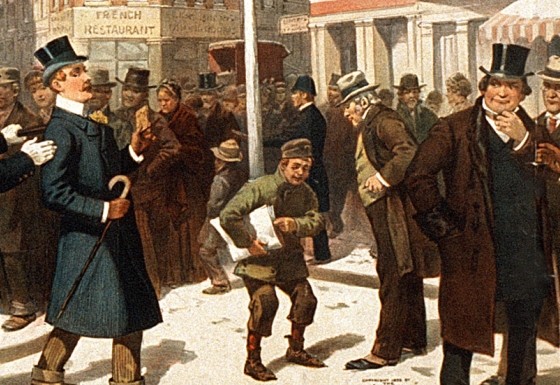(Updated July 2016)
Pennsylvania Gazette (Philadelphia, 1776-1793)
- Benjamin Franklin’s Pennsylvania Gazette was one of the most respected and influential newspapers in America during these decades. This rare run of the Pennsylvania Gazette complements the earlier issues in Early American Newspapers, Series 1 and 2.
National Intelligencer, Tri-Weekly Edition (Washington, D.C., 1813-1828) and United States Telegraph, Daily Edition (Washington, D.C., 1826-1833)
- During these decades, these papers were the two leading political organs in Washington. The National Intelligencer was founded to support the Jefferson administration, and was for years the official publication for Congressional reports. After the election of Andrew Jackson in 1829, power shifted to the United States Telegraph. Early American Newspapers, Series 10, offers researchers access to the opposing viewpoints of these powerful papers for the first time. This tri-weekly edition of the National Intelligencer complements other editions in Early American Newspapers, Series 1 and 6; this daily edition of the United States Telegraph complements the tri-weekly edition in Series 6.
Los Angeles Daily Star (1872-1876) and Oakland Daily Transcript (1869-1876)
- These two early California dailies are the earliest titles in their cities to appear in any Early American Newspapers series to date.
Frank Leslie’s Illustrirte Zeitung (New York, New York; 1858-1866)
- Leslie’s newspaper was the most lavishly illustrated newspaper in America. This German-language edition offers researchers unparalleled illustrative Civil War battle maps, portraits, and military panoramas.
Christian Watchman (Boston, Massachusetts; 1821-1850)
- Published in association with the Baptist Missionary Society, the Christian Watchman was 0ne of the earliest and most influential religious newspapers in America. Religious news included reports of Bible, missionary, and tract societies, both in the U.S. and abroad. Non-religious material included general news, poetry, book reviews, biography, and articles on history, education, and agriculture.
Helena Weekly Herald (Helena, Montana; 1872-1888)
- This rare run of the Helena Weekly Herald covers the Montana Territory during the tragic Indian conflicts of the era, including the Battle of the Little Bighorn.
Western Spy and Hamilton Gazette (Cincinnati, Ohio; 1799-1805)
- When Ohio became a state in 1803, the Western Spy was one of the only two newspapers within its borders.
Louisville Daily Courier (Louisville, Kentucky; 1853-1868)
- As a pro-Confederacy paper in the crucial border state of Kentucky, the Louisville Daily Courier’s coverage of the Civil War in Series 10 will be of particular interest to researchers.
Boston Daily Bee (Boston, Massachusetts; 1843-1857)
- As the official organ of the controversial American Party, this full run of the Boston Daily Bee offers a detailed look at the principles that divided the many political factions competing for power during the decades leading up to the Civil War.
Trump of Fame (Warren, Ohio; 1816-1861)
- An early Free-Soil party organ, this paper's coverage and shifting political views during this era provide an inside look at the political history of the Free-Soil Party, the Whig Party, and the emerging modern Republican Party.
Detroit Gazette (Detroit, Michigan; 1817-1830)
- One of the first newspapers in Michigan, John P. Sheldon’s Detroit Gazette offers a rare first-hand account of the region’s early history. All of the stories were printed in English on its first three pages; the most important stories were re-printed in French on page four.
Fort Smith New Era (Fort Smith, Arkansas; 1869-1880)
- “The Oldest Republican Newspaper in the Now Defunct Confederacy” is how publisher Valentine Dell described his confrontational Fort Smith Weekly New Era after the Civil War. The paper’s politically brave position as a pro-Union, Republican paper in the South will be of particular interest to historians of the Reconstruction period.
Manchester Daily Mirror (Manchester, New Hampshire; 1851-1863)
- Under publisher John B. Clarke, the Daily Mirror became one of the most popular and influential newspapers in New England. The run here covers the rise of the paper, the contentious politics of the region during the decade preceding the Civil War, and the turmoil that would follow as the War began.
Gallup Gleaner (Gallup, New Mexico; 1889-1896)
- Founded in 1881 as a major Territorial rail-head on the Atlantic and Pacific Railroad, Gallup was surrounded by several Native American tribes. The Gallup Gleaner offers a vivid look at the intersection of cultures in New Mexico before it became a state in 1912.
Sentinel (Richmond, Virginia; 1863-1866)
- The Richmond Sentinel was founded in 1863 to support the Jefferson Davis administration. The paper’s editorial battles with the anti-Davis papers in the Confederate capitol offer a rich vision of Southern politics during the Civil War.
Carillon (New Orleans, Louisiana; 1869-1875)
- This combative French-language newspaper (title in English: “The Alarm Bell”) was published as a reaction to the hardships of Reconstruction.
Columbian Museum and Savannah Advertiser (Savannah, GA, 1800-1822)
- One of the earliest newspapers in Georgia’s oldest city, the Columbian Museum and Savannah Advertiser offers a rare first-hand account of the region during the Early National period.
Daily Inter Ocean (Chicago, Illinois; 1865-1871)
- One of the most influential newspapers in Chicago during this era, the Inter Ocean employed Samuel Clemens (Mark Twain) as a correspondent in 1868. The Chicago Republican was relaunched as the Chicago-based Inter Ocean in 1872.
Puget Sound Weekly Argus (Port Townsend, Washington; 1870-1883)
- Located at the Northern entrance to Puget Sound, Port Townsend was one of the major trading ports in the Pacific Northwest during this era. The Argus provides a first-hand account of the booming timber and mining economies of the period, and of the ongoing conflicts with the many Native American tribes in the region.
Leavenworth Daily Conservative (Leavenworth, Kansas; 1861-1865)
- A staunch Conservative voice in Kansas during this era, the Daily Conservative placed correspondents in every county in the state, and offers a detailed history of Kansas during the turmoil of the Civil War.
Alaska Herald (San Francisco, California; 1868-1874)
- The first newspaper to focus its coverage on Alaska, the Alaska Herald was founded by Agapius Honcharenko, who had fled Russia on charges of advocating the liberation of serfs. Honcharenko’s paper saw a great future for the Alaskan region; early issues included Russian translations of the United States Constitution.
Each of these titles in this series represents the earliest newspaper in their state to appear to date in Early American Newspapers:
- New York Gazette (New York, New York; 1730-1738)
- North Carolina Gazette (New Bern, North Carolina; 1775)
- East Florida Gazette (St. Augustine, Florida; 1783)
- Centinel of the North Western Territory (Cincinnati, Ohio; 1795)
- Le Telegraph et le Commercial Advertiser (New Orleans, Louisiana; 1803-1804)
- Mississippi Messenger (Natchez, Mississippi; 1804-1808)
- Madison Gazette (Huntsville, Alabama; 1813-1815)
- Mobile Gazette (Mobile, Alabama; 1813-1820)
- Detroit Gazette (Detroit, Michigan; 1817-1830)
- Sandwich Island Gazette and Journal of Commerce (Honolulu, Hawaii; 1836-1839)
- Omaha Arrow (Omaha, Nebraska; 1854)
- Weekly Arizonian (Tubac, Arizona; 1859-1860)
- Frontier Scout (Fort Rice, North Dakota; 1865)






















































